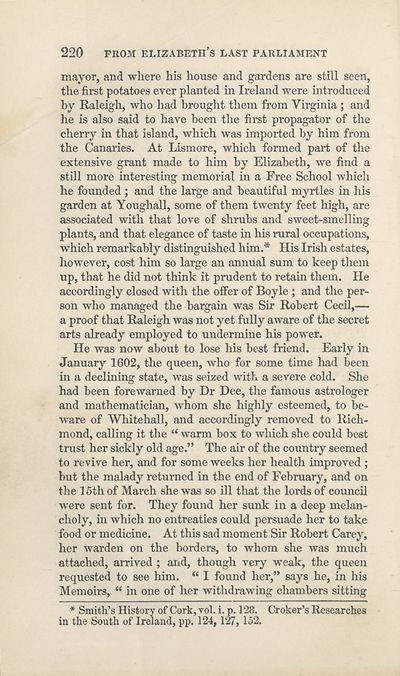Download files
Complete book:
Individual page:
Thumbnail gallery: Grid view | List view

220 PROM ELIZABETH’S LAST PARLIAMENT
mayor, and where his house and gardens are still seen,
the first potatoes ever planted in Ireland were introduced
by Raleigh, who had brought them from Virginia ; and
he is also said to have been the first propagator of the
cherry in that island, which was imported by him from
the Canaries. At Lismore, which formed part of the
extensive grant made to him by Elizabeth, we find a
still more interesting memorial in a Free School which
he founded ; and the large and beautiful myrtles in his
garden at Youghall, some of them twenty feet high, are
associated with that love of shrubs and sweet-smelling
plants, and that elegance of taste in his rural occupations,
which remarkably distinguished him.* His Irish estates,
however, cost him so large an annual sum to keep them
up, that he did not think it prudent to retain them. He
accordingly closed with the offer of Boyle ; and the per¬
son who managed the bargain was Sir Robert Cecil,—
a proof that Raleigh was not yet fully aware of the secret
arts already employed to undermine his power.
He was now about to lose his best friend. Early in
January 1602, the queen, who for some time had been
in a declining state, was seized with a severe cold. She
had been forewarned by Dr Dee, the famous astrologer
and mathematician, whom she highly esteemed, to be¬
ware of Whitehall, and accordingly removed to Rich¬
mond, calling it the “ warm box to which she could best
trust her sickly old age.” The air of the country seemed
to revive her, and for some weeks her health improved ;
but the malady returned in the end of February, and on
the 15th of March she was so ill that the lords of council
were sent for. They found her sunk in a deep melan¬
choly, in which no entreaties could persuade her to take
food or medicine. At this sad moment Sir Robert Carey,
her warden on the borders, to whom she was much
attached, arrived ; and, though very weak, the queen
requested to see him. “ I found her,” says he, in his
Memoirs, “ in one of her withdrawing chambers sitting
* Smith’s History of Cork, vol. i. p. 128. Croker’s Researches
in the South of Ireland, pp. 124, 127, 152.
mayor, and where his house and gardens are still seen,
the first potatoes ever planted in Ireland were introduced
by Raleigh, who had brought them from Virginia ; and
he is also said to have been the first propagator of the
cherry in that island, which was imported by him from
the Canaries. At Lismore, which formed part of the
extensive grant made to him by Elizabeth, we find a
still more interesting memorial in a Free School which
he founded ; and the large and beautiful myrtles in his
garden at Youghall, some of them twenty feet high, are
associated with that love of shrubs and sweet-smelling
plants, and that elegance of taste in his rural occupations,
which remarkably distinguished him.* His Irish estates,
however, cost him so large an annual sum to keep them
up, that he did not think it prudent to retain them. He
accordingly closed with the offer of Boyle ; and the per¬
son who managed the bargain was Sir Robert Cecil,—
a proof that Raleigh was not yet fully aware of the secret
arts already employed to undermine his power.
He was now about to lose his best friend. Early in
January 1602, the queen, who for some time had been
in a declining state, was seized with a severe cold. She
had been forewarned by Dr Dee, the famous astrologer
and mathematician, whom she highly esteemed, to be¬
ware of Whitehall, and accordingly removed to Rich¬
mond, calling it the “ warm box to which she could best
trust her sickly old age.” The air of the country seemed
to revive her, and for some weeks her health improved ;
but the malady returned in the end of February, and on
the 15th of March she was so ill that the lords of council
were sent for. They found her sunk in a deep melan¬
choly, in which no entreaties could persuade her to take
food or medicine. At this sad moment Sir Robert Carey,
her warden on the borders, to whom she was much
attached, arrived ; and, though very weak, the queen
requested to see him. “ I found her,” says he, in his
Memoirs, “ in one of her withdrawing chambers sitting
* Smith’s History of Cork, vol. i. p. 128. Croker’s Researches
in the South of Ireland, pp. 124, 127, 152.
Set display mode to:
![]() Universal Viewer |
Universal Viewer | ![]() Mirador |
Large image | Transcription
Mirador |
Large image | Transcription
| Antiquarian books of Scotland > Politics & government > Life of Sir Walter Raleigh > (226) |
|---|
| Permanent URL | https://digital.nls.uk/113655116 |
|---|
| Description | Thousands of printed books from the Antiquarian Books of Scotland collection which dates from 1641 to the 1980s. The collection consists of 14,800 books which were published in Scotland or have a Scottish connection, e.g. through the author, printer or owner. Subjects covered include sport, education, diseases, adventure, occupations, Jacobites, politics and religion. Among the 29 languages represented are English, Gaelic, Italian, French, Russian and Swedish. |
|---|

